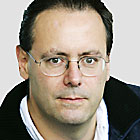President-elect Obama's political roots are not merely in Chicago but in its Midwest Academy for progressive activists. The academy offers clues to how an Obama administration may work – and for how we can best engage with it. The Midwest Academy's mission is to champion the poor, originally against the power elite of the city that spawned Al Capone. It grew from the pioneering work of Saul Alinsky, whose Industrial Areas Foundation trained many progressive leaders in US politics. Alinsky's classic text, Rules for Radicals, still offers a practicality and humour, absent from the sour, low-church intellectualism that characterises so much of the European left. Famously, Alinsky's people threatened to occupy the toilets of Chicago's airport as part of a protest against a runway extension that would have flattened their neighbourhood. I came across Alinsky's work while training as a community worker in Britain, and it remains an inspiration, though tragically neglected in wider politics. In 1990, Obama contributed a chapter, "Why Organise?", to a book looking at Alinsky's legacy. Such a question would not be likely to appear on the publications list of an aspiring British politician. Here, there is a political class that confines itself to analysis and writing policy papers, organising remains a "below stairs" activity beneath the dignity not only of the Bullingdon club, but also of left-wing intellectuals. When I wrote an organising manual for CND in the 1980s, local activists loved it, but the intellectual left simply could not see the point. Take a look at the chapter headings of the current edition of Organising for Social Change, the Midwest Academy's manual: Developing a Strategy, Organising Models: The underlying structure of organization, Building and Joining Coalitions, Developing Leadership, Using The Media, Working With Religious Organisations and With Unions, Public Speaking, Working With Community Organisation Boards, On Line Research and Tactical Investigation, Grass Roots Fundraising, Supervision, Administrative Systems and The New Economy. These are not on the CVs of many UK politicians. Anyone seeking to understand what Barack Obama will be bringing to the world should get to grips with this thinking, whether one likes it or not. The Midwest Academy approach is no panacea, not least because it is designed for a domestic rather than an international stage, but understanding it will at a minimum provide a basis for analysing Obama's tactics. More optimistically, the Academy's approach offers critical tools for progressive politics, of rather more use, say, than the "nudge" politics, which has been a recent fashion. Alinsky put it this way: "The Prince was written by Machiavelli for the Haves on how to hold power. Rules for Radicals is written for the Have-Nots on how to take it away. The means-and-ends moralists, constantly obsessed with the ethics of the means used by the Have-Nots against the Haves, should search themselves as to their real political position. In fact, they are passive – but real – allies of the Haves … The most unethical of all means is the non-use of any means ... The standards of judgment must be rooted in the whys and wherefores of life as it is lived, the world as it is, not our wished-for fantasy of the world as it should be." This is a terminology referred to by Michelle Obama in her address to the Democratic national convention. Those who look to Obama with hope for what he may bring should not treat his presidency as a spectator sport; his opponents certainly will not. Franklin Roosevelt was wont to say, "You've convinced me, now go out and pressure me." Whether the issue is economic justice, climate chaos or the Iranian bomb, the Obama administration will have its work cut out creating a positive dynamic within the still-viciously partisan politics of the United States. The most difficult task will be not to fall simply in adulation behind the policy that comes from Washington, because it is Obama's. These policies will have been created to manage internal US political dynamics, but they may not be likely to succeed at an international level. Culturally, US liberals can be as arrogant as their conservative opponents. Engaging with the US as Obama's initiatives emerge will provide the sort of creative challenge many of us never expected. We need to learn from those who taught Obama, not just to understand his approach but so that we can improve our own performance. For Alinsky, the key was to get the poor into the game. Now, if Obama stays true to his roots, the game will be on: so who wants to play?The Alinsky legacy
The jibe about him being a 'community organiser' may come to haunt his opponents: Obama knows how to get things done
Thursday, 6 November 2008
Posted by
Britannia Radio
at
18:29
![]()






















